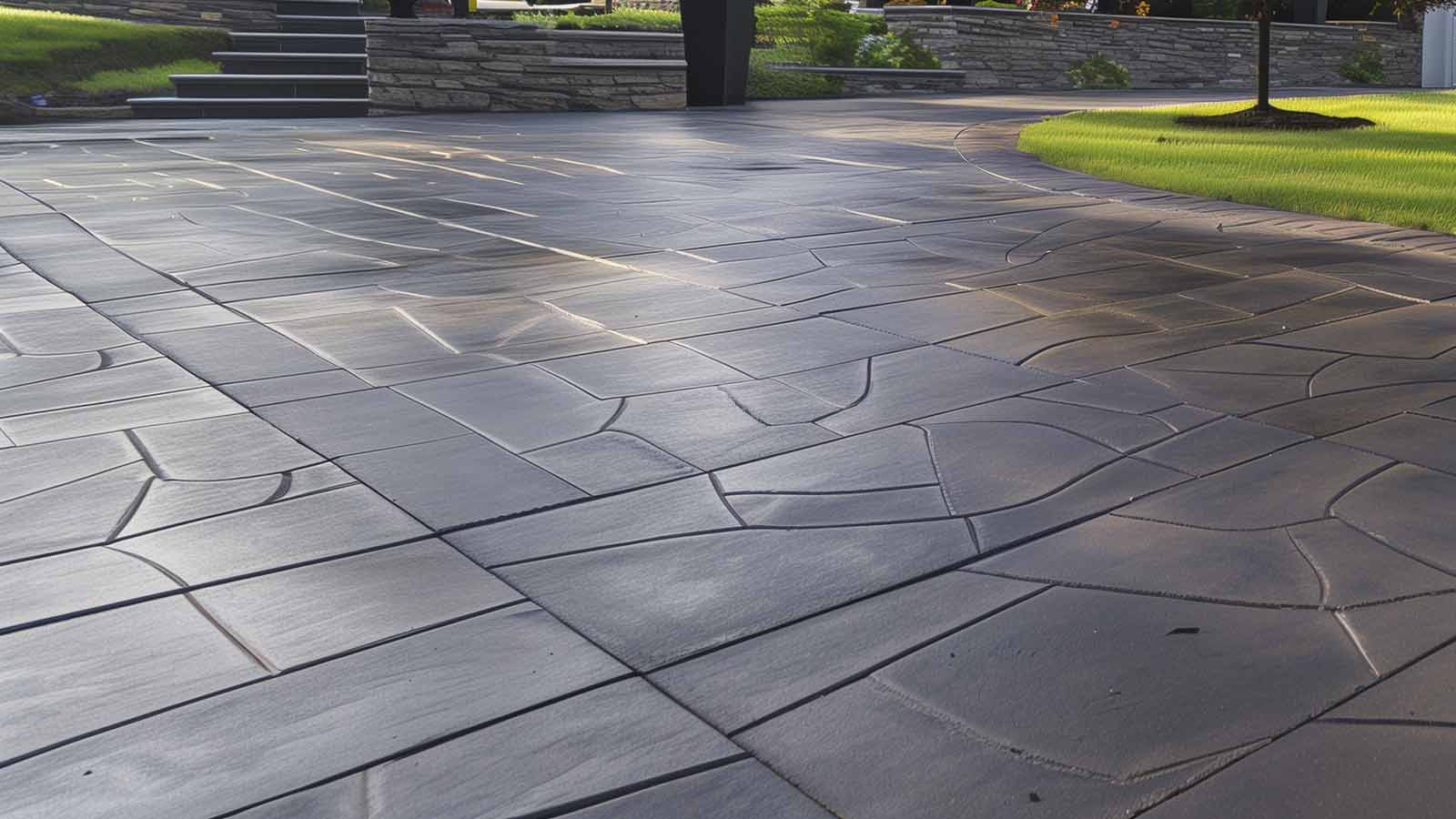Paving contractors are highly trained professionals who specialize in constructing various paved surfaces, from sidewalks and walkways to roads, patios, and driveways.
There are two different types of paving professionals, residential and commercial, and every kind of concrete and paving project is unique and requires the right tools, equipment, expertise, and know-how.
NVN Paving is the premier residential and commercial local paving contractors that can help you plan and execute any concrete paving project, big or small.
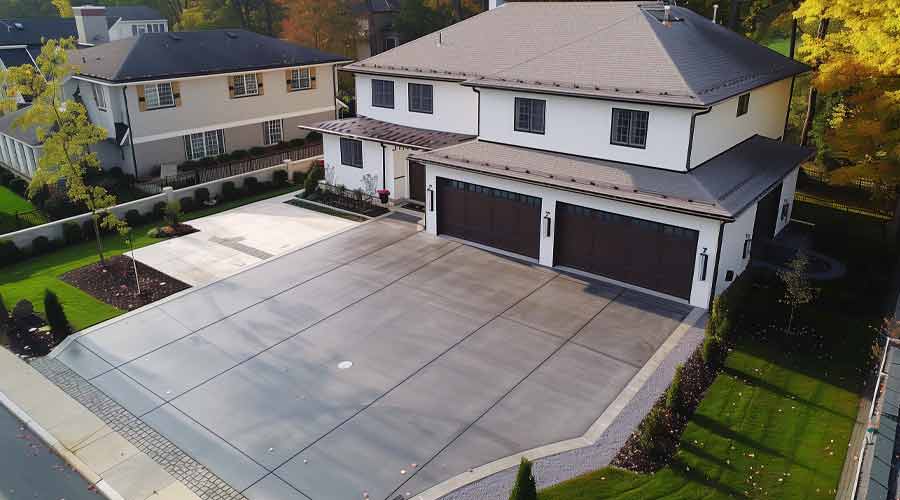
Understanding Concrete Pavements: A Guide for Somerset County Homeowners
The purpose of paving your home is to improve the aesthetic and functionality of your Passaic County, Bergen County, or Somerset County landscape.
Although many associate concrete with roads and sidewalks, you will be amazed at the multiple residential applications of concrete paving and how this versatile material can beautify your home while saving you money.
Types of Concrete Pavers Suitable for Driveways and Walkways
Although an asphalt driveway is the gold standard in the residential paving industry, concrete pavers might be a great alternative if you want a more unique style.
Some benefits of concrete pavers for your driveway and walkway include:
- Durability: Less prone to breakage, and if one paver does become damaged, the single paver can easily be replaced.
- Less maintenance: You can seal a driveway made from concrete pavers periodically, unlike the need for sealing asphalt every two to three years.
- Less hazardous in winter: Pavers are less slippery, which is safer during an icy New Jersey winter.
- No curing time: Asphalt and poured cement must cure for several days. You can drive on and enjoy your paved driveway immediately.
Consider these four types of pavers for your NJ walkways and driveways:
- Plain gray
- Stamped
- Colored or textured
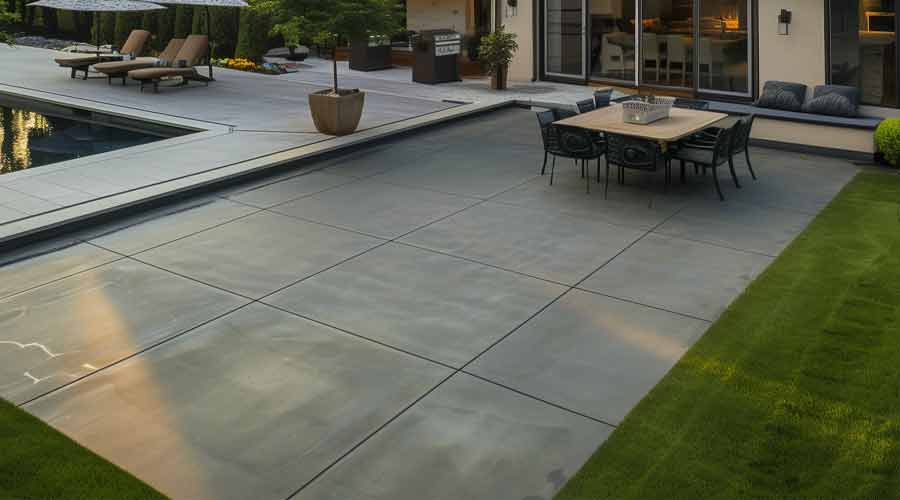
Cost-Effective Solutions for Concrete Paving in Residential Areas
One of the biggest pros of concrete paving is its low installation and maintenance costs compared to other construction materials.
If your budget is lacking but you still want to increase your home’s curb appeal through a new concrete paver patio, driveway, or walkway, there are several ways you can save money, including:
- Contact multiple contractors: Ask for free quotes from at least three to four concrete contractors.
- Tackle some site preparation: Remove any large debris and start breaking up your driveway or walkway to save on labor costs. Leave all other jobs, including excavation, site preparation, and grading, to the pros.
- Choose plain gray concrete: Stained and stamped concrete are attractive but expensive. Install gray concrete pavers to save cash.
Budgeting for Your Next Paving Project: What You Need to Know
Several factors come into play when calculating the cost of a new concrete paver driveway or walkway, such as:
- Concrete type
- Paver thickness
- Project’s size
- Labor
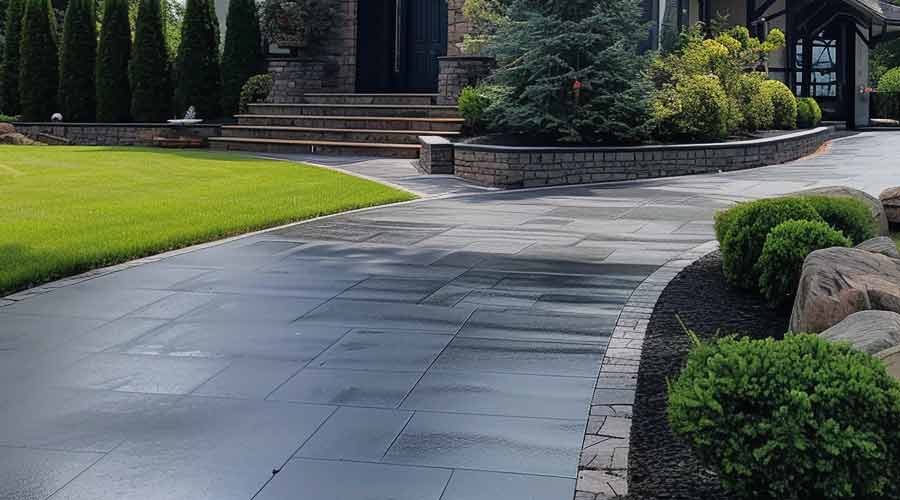
Maintenance Tips for Extending the Life of Concrete Surfaces
Concrete pavers are strong, but even the most durable material will become weakened by the harsh weather conditions you experience living in New Jersey, particularly the brutal Garden State winters.
The team at NVN Paving offers comprehensive maintenance plans to ensure your driveway stays functional and elegant for decades.
Watch for these telltale signs you need a professional to maintain your residential paved surfaces:
- Missing pavers
- Severe sun fading and cracking
- Shifting pavers
- Sudden issues with drainage
Best Practices for Maintaining Concrete Driveways and Walkways
Concrete is durable, and a well-maintained concrete surface can last between 30 and 100 years!
Proper maintenance is truly the key to extending the life of your residential concrete, and there are several ways you as a homeowner can tackle this DIY project, including:
- Clean the driveway often: Use soapy water and your garden hose to clean your driveway several times yearly.
- Fill joints and cracks between pavers: Strengthen the driveway by pouring pebbles or polymeric sand between joints.
- Avoid using rock salt and harsh chemical deicers: Prevent a slip and fall injury by deicing with a product rated for use on concrete, such as calcium chloride.
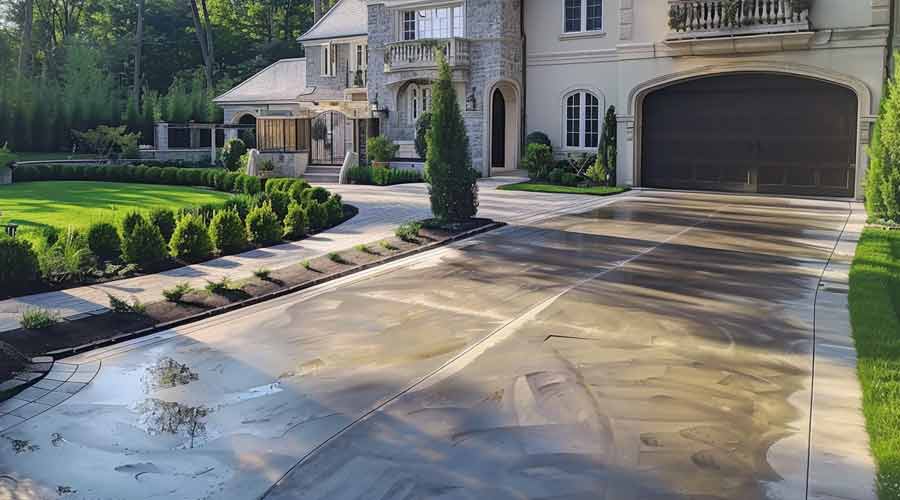
Designing Your Outdoor Space with Paving Stones and Concrete
Concrete pavers are hardwearing but elegant, refined, and can add an aesthetic flair that will increase your property’s value and curb appeal.
Unlike stamped concrete, which mimics the look of pavers for less money, authentic concrete pavers are highly customizable and can easily be arranged in a visually appealing, one-of-a-kind pattern that will make your New Jersey property the talk of the neighborhood.
Enhancing Your Property’s Aesthetics with Durable Paving Stones
Concrete paving stones are available in an unbelievable range of styles and colors, complementing and elevating every residential property.
Color and patterns are also the best way to add visual interest to concrete pavers.
Some popular paver patterns for walkways and patios include:
- Basketweave
- Herringbone
- Parquet
- Running bond
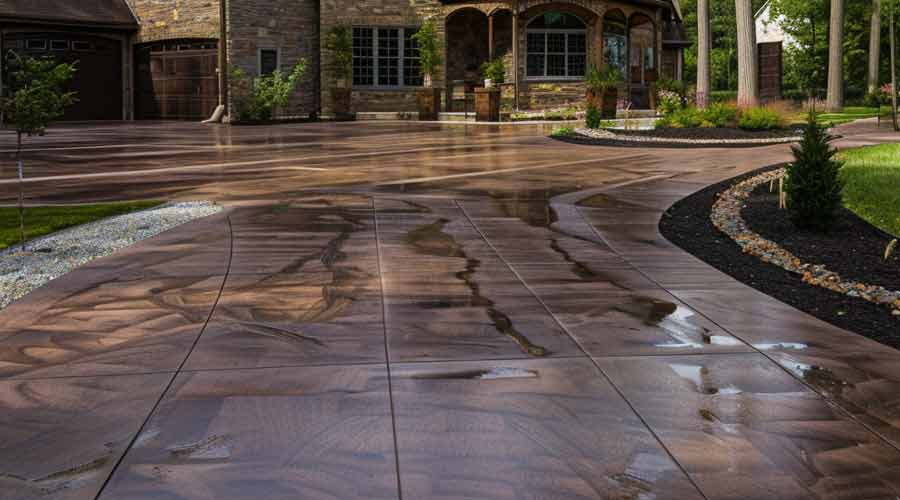
Innovations in Concrete Slabs for Enhanced Outdoor Living
Modern concrete has come a long way since its invention in 1756!
Today’s concrete has been updated, and believe it or not, there have been several innovations in the concrete industry over the past few years, from bendable concrete to high-performance or “smart” concrete!
At NVN Paving, we are well-versed in the latest technology and can help you find the best product for your pavers and patios.
The Importance of Durability in Concrete Paving Projects
Did you know that most concrete pavers can withstand up to a whopping 8,000 pounds per square inch, making the product even more durable than poured concrete?
This level of durability is critical when considering a concrete driveway, especially in New Jersey, where there are constant temperature fluctuations.
How Temperature Changes Affect Concrete Slabs in Somerset County
Although concrete pavers are strong, there are several instances when poured concrete slabs are necessary.
When pouring concrete, the temperature can impact the concrete slab in many ways, including volume changes, setting time, and the final strength of the product.
Even cured concrete is impacted by the weather, and the extreme cold and heat can lead to fading and cracking.
Proper maintenance is key, which is why we recommend having your concrete repaired immediately at the first sign of damage.
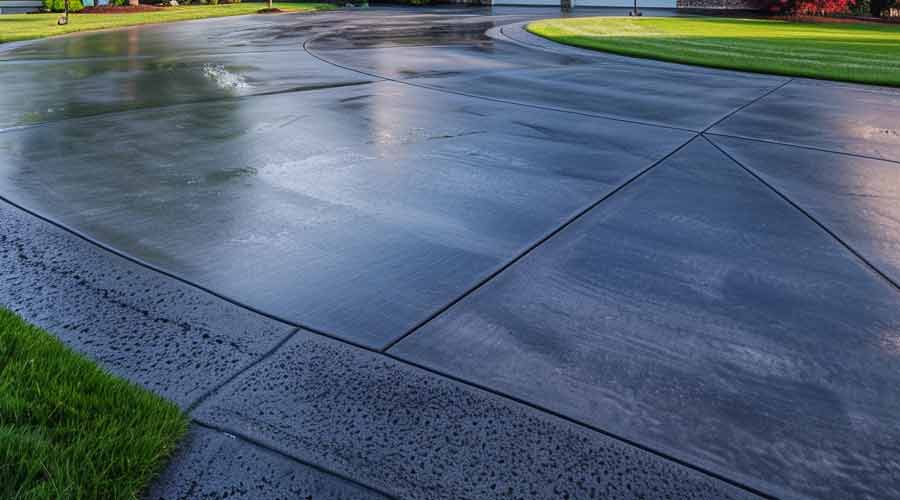
Impact of Weather on the Longevity of Concrete Surface
Unfortunately, you cannot control Mother Nature, and when temperature changes exacerbate damage, it will eventually lead to the need to replace your concrete slabs.
When this occurs, look to a professional to handle the entire installation process to always ensure your next slab can handle the tricky New Jersey weather.
Construction Techniques for Concrete Pavements in Outdoor Spaces
Concrete is the ideal material for commercial projects for the same reasons why homeowners rely on this versatile material.
If you are considering using concrete and pavers for your next commercial job, contact us for a free quote.
Evaluating the Cost of Concrete Paving for Parking Lots
Cost is a significant consideration for every commercial paving project, particularly in massive parking lots and parking structures.
Poured concrete and concrete pavers are two options, along with asphalt, gravel, and the lesser-used tar and chip paving – but which makes the most financial sense for your project?
Comparative Analysis of Concrete Pavements Versus Other Materials
Installation costs include the price of materials, ground preparation, and maintenance after the product is installed.
Asphalt has a lower initial installation cost than poured concrete or pavers but higher maintenance and repair costs over the life of the product.
Gravel is the least expensive option, but the lifetime maintenance costs are far higher than any other product on the list.
Tar and chip surfaces are similarly priced to gravel, but the average lifespan of this system is only seven to 10 years.
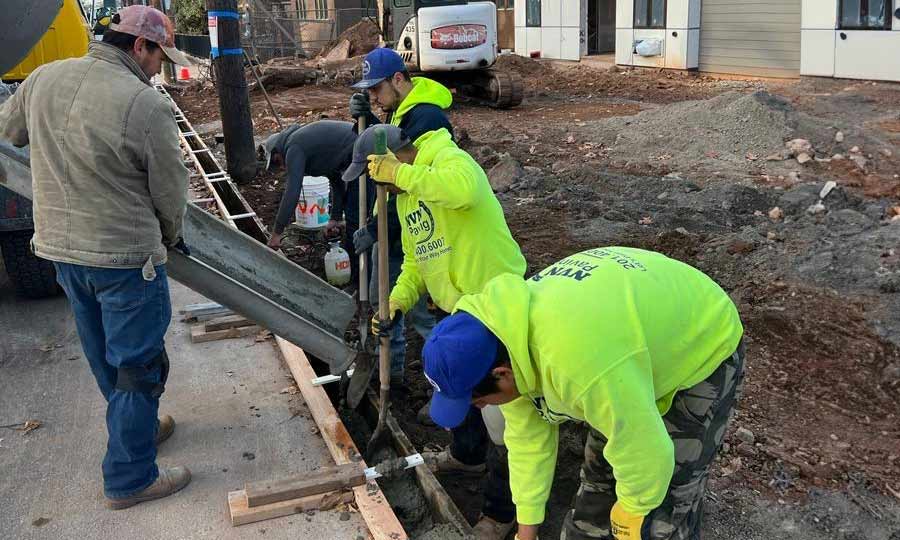
Concrete Slab Installation: Key Considerations for Local Contractors
Concrete slabs are a go-to in the construction industry, but there are several critical considerations for local New Jersey contractors, including:
- Slab thickness
- The concrete’s mix, which impacts shrinkage, curling, and the product’s freeze/thaw resistance
- Site preparation
A representative from NVN Paving will discuss all these factors and help you create a comprehensive plan for your next commercial project.
The Role of Concrete in Modern Construction Projects
Concrete has been instrumental in modern construction and infrastructure for many reasons, thanks to the product:
- Versatility
- Adaptability
- Sustainability
There is a reason why concrete has many applications, from building major bridges to creating the perfect patio to enjoy a cup of coffee on your lunch break.
Advantages of Concrete Pavement for High-Traffic Areas
Asphalt isn’t the only option for your parking lot paving project!
Concrete paving has several advantages, particularly in congested, heavily traveled indoor and outdoor projects, especially its durability, ease of maintenance, energy efficiency, and longer lifespan.
Choosing the Right Concrete Pavers for Your Square Foot Needs
You have a massive project and a tight budget; which concrete pavers or concrete paving solutions are suitable for your bottom line?
You’ve already learned about the factors that influence your overall costs, and if you want to enjoy the most affordable solution, consider a plain gray concrete paver and a straightforward installation for a larger project.
If the project is smaller and your budget allows, colorful pavers in a unique pattern will add dimension and texture to any commercial space.
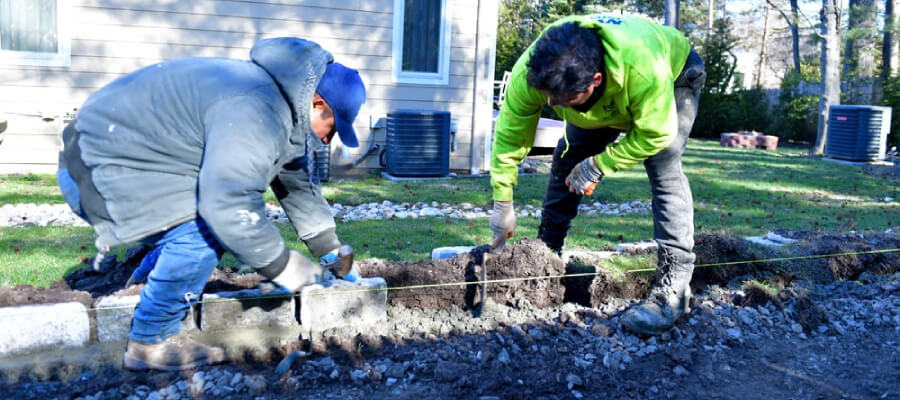
Asphalt & Concrete Common Questions
Is it cheaper to concrete or pave?
The initial installation of poured concrete is cheaper than that of concrete pavers, but the lifetime costs of pavers are typically far less.
A paving company representative will happily discuss your options if you want to learn more.
What is the difference between paving and concrete?
Paving refers to installing different types of individual pavers, including concrete, brick, clay, natural stone, porcelain, rubber, plastic, or even resin.
Concrete is associated with poured concrete surfaces.
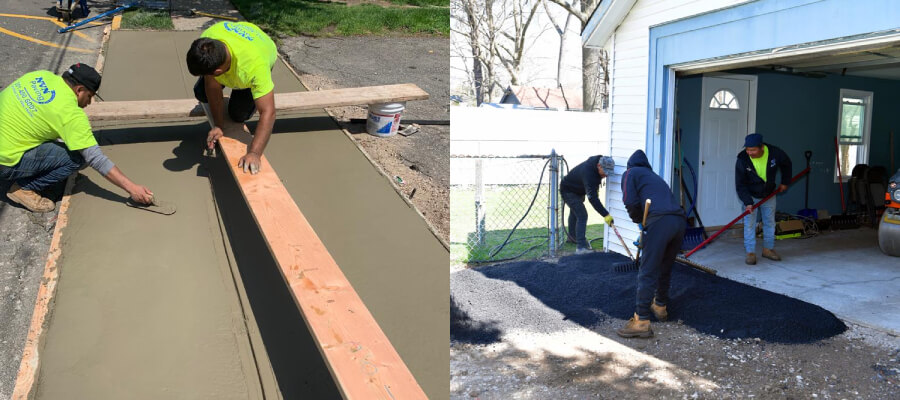
Is concrete paving expensive?
Although pavers are more expensive upfront than poured concrete or asphalt, the long-term maintenance and repair savings more than make up for any higher initial investment!
What are the disadvantages of concrete paving?
There are a few downsides to choosing concrete paving, including:
- The initial installation costs
- Concrete does not last as long as natural stone pavers
- Not as visually appealing as other products
